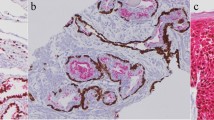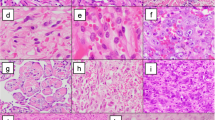Abstract
Background
The prognostic significance of blood vessel invasion (BVI) and lymphatic vessel invasion (LVI) is unclear. Because of the absence of specific markers for venous and lymphatic vessels, earlier studies could not reliably distinguish between BVI and LVI.
Methods
By immunostaining for podoplanin and CD34 antigen, we retrospectively investigated LVI and BVI in 419 tissue specimens of colorectal carcinoma. We performed univariate and multivariate analysis of the clinicopathologic features, frequency of recurrence, and outcome of patients with or without LVI and BVI.
Results
The use of hematoxylin and eosin (H&E) staining to identify BVI and LVI yielded a false positive rate of 9.1% and false negative rate of 12.6%. The incidence of BVI was significantly higher among tumors with LVI than tumors without LVI (P <.001). In logistic multivariate analysis, only LVI (P < .001) was associated with lymph node metastasis and BVI (P = .015) was associated with distant recurrence. Calculating the prognostic relevance, both two invasion types correlated with decreased survival in univariate analysis (both P <.001). In multivariate analysis, BVI (P =.024), lymph node status (P =.003) and tumor stage (P <.001) remained statistically significant factors for survival.
Conclusions
Our results suggest that immunohistologic evaluation of BVI and LVI could be useful in colorectal carcinoma indicating the risk of lymph node metastasis and recurrence, thereby contributing to prognostic evaluation.


Similar content being viewed by others
References
Sakuragi N, Takeda N, Hareyama H, Fujimoto T, Todo Y, Okamoto K. A multivariate analysis of blood vessel and lymph vessel invasion as predictors of ovarian and lymph node metastases in patients with cervical carcinoma. Cancer 2000; 88:2578–83
Katharina S, Peter B, Verena G, Adelheid E, Silvana G. Prognostic Value of Lymphatic and Blood Vessel Invasion in Neuroendocrine Tumors of the Lung. Am J surg pathol 2005; 25:324–8
Minsky BD, Mies C, Rich TA, Recht A. Lymphatic vessel invasion is an independent prognostic factor for survival in colorectal cancer. Int J Radiat Oncol Biol Phys 1989; 17:311–8
Sternberg A, Amar M, Alfici R, Groisman G. Conclusions from a study of venous invasion in stage IV colorectal adenocarcinoma. J Clin Pathol 2002; 55:17–21
Krasna MJ, Flancbaum L, Cody RP, Shneibaum S, Ari GB. Vascular and neural invasion in colorectral carcinoma - incidence and prognostic significance. Cancer 1988; 61:1018–23
Compton C, Fenoglio-Preiser CM, Pettigrew N, Fielding LP. American Joint Committee on Cancer Prognostic Factors Consensus Conference: Colorectal Working Group. Cancer 2000; 88:1739–57
Breiteneder-Geleff S, Soleiman A, Kowalski H, et al. Angiosarcomas express mixed endothelial phenotypes of blood and lymphatic capillaries: Podoplanin as a specific marker for lymphatic endothelium. Am J Pathol 1999; 154:385–94
Valencak J, Heere-Ress E, T kopp, Schoppmann SF, Kittler H, Pehamberger H. Selective immunohistochemical staining shows significant prognostic influence of lymphatic and blood vessels in patients with malignant melanoma. European journal of cancer 2004; 40:358–64
Jass JR, Sobin LH. (1989) World Health Organization international histological classification of the tumors: histological typing of intestinal tumors. 2nd ed. New York: Springer-verlag
Astler VB, Coller FA. The prognostic significance of direct extension of carcinoma of the colon and rectum. Ann Surg 1954 139(6):846–52
Ono M, Sakamoto M, Ino Y, et al. Cancer cell morphology at the invasive front and expression of cell adhesion-related carbohydrate in the primary lesion of patients with colorectal carcinoma with liver metastasis. Cancer 1996; 78:1179–86
Hase K, Shatney C, Johnson D, Trollope M, Vierra M. Prognostic value of tumor “budding” in patients with colorectal cancer. Dis Colon Rectum 1993 36(7):627–35
Liang P, Hong JW, Ubukata H, et al. Myofibroblasts correlates with lymphatic microvessel density and lymph node metastasis in early-stage invasive colorectal carcinoma. Anticancer Res 2005; 25:2705–12
Liang P, Hong JW, Ubukata H, et al. Increased density and diameter of lymphatic microvessels correlate with lymph node metastasis in early stage invasive colorectal carcinoma. Virchows Archiv 2006; 448:570–575
Wiggers T, Arends JW, Volovics A. Regression analysis of prognostic factors in colorectal cancer after curative resections. Dis Colon Rectum 1988 31(1):33–41
Chapuis PH, Dent OF, Fisher R, et al. A multivariate analysis of clinical and pathological variables in prognosis after resection of large bowel cancer. Br J Surg 1985 72 (9):698–702
De Vita VT, Hellman SL, Rosenberg SA, eds. Cancer: Principles and Practice of Oncology. Philadephia. JB Lippincott, 2001
Sternberg A, Amar M, Alfici R, Groisman G. Conclusions from a study of venous invasion in stage IV colorectal adenocarcinoma. J Clin Pathol 2002; 55(1):17–21
Minsky B, Mies C. The clinical significance of vascular invasion in colorectal cancer. Dis Colon Rectum 1989; 32(9):794–803
Talbot IC, Ritchie S, Leighton MH, Hughes AO, Bussey HJ, Morson BC. Spread of rectal cancer within veins. Histologic features and clinical significance. Am J Surg 1981; 141(1):15–7
Kim JC, Roh SA, Lee KH, Namgung H, Kim JR, Kim JS. Genetic and pathologic changes associated with lymphovascular invasion of colorectal adenocarcinoma. Clin Exp Metastasis 2005; 22(5):421–8
Brodsky JT, Richard GK, Cohen AM, Minsky BD. Variables correlated with the risk of lymph node metastasis in early rectal cancer. Cancer 1992; 69(2):322–6
Saclarides TJ, Bhattacharyya AK, Britton-Kuzel C, Szeluga D, Economou SG. Predicting lymph node metastases in rectal cancer. Dis Colon Rectum 1994 ; 37(1):52–7
Bayar S, Saxena R, Emir B, Salem RR. Venous invasion may predict lymph node metastasis in early rectal cancer. Eur J Surg Oncol 2002; 28(4):413–7
Schoppmann SF, Bayer G, Aumayr K, et al. Prognostic value of lymphangiogenesis and lymphovascular invasion in invasive breast cancer. Ann Surg 2004; 240(2):306–12
Shirouzu K, Isomoto H, Kakegawa T, Morimatsu M. A prospective clinicopathologic study of venous invasion in colorectal cancer. Am J Surg 1991; 162(3):216–22
Meguerditchian AN, Bairati I, Lagace R, Harel F, Kibrite A. Prognostic significance of lymphovascular invasion in surgically cured rectal carcinoma. Am J Surg 2005; 189(6):707–13
Horn A, Dahl O, Morild I. Venous and neural invasion as predictors of recurrence in rectal adenocarcinoma. Dis Colon Rectum 1991; 34(9):798–804
Mandriota SJ, Jussila L, Jeltsch M, et al. Vascular endothelial growth factor-C-mediated lymphangiogenesis promotes tumour metastasis. EMBO J 2001; 20(4):672–82
He Y, Karpanen T, Alitalo K. Role of lymphangiogenic factors in tumor metastasis. BBA 2004; 1654:3–12
Acknowledgments
The authors thank Tsutomu Kohda for technical assistance and are grateful to Prof. J. Patrick Barron of the International Medical Communications Center of Tokyo Medical University for his review of this manuscript. This work was supported by the Tokyo Medical University Cancer Foundation (200409).
Author information
Authors and Affiliations
Corresponding author
Rights and permissions
About this article
Cite this article
Liang, P., Nakada, I., Hong, JW. et al. Prognostic Significance of Immunohistochemically Detected Blood and Lymphatic Vessel Invasion in Colorectal Carcinoma: Its Impact on Prognosis. Ann Surg Oncol 14, 470–477 (2007). https://doi.org/10.1245/s10434-006-9189-3
Received:
Revised:
Accepted:
Published:
Issue Date:
DOI: https://doi.org/10.1245/s10434-006-9189-3




